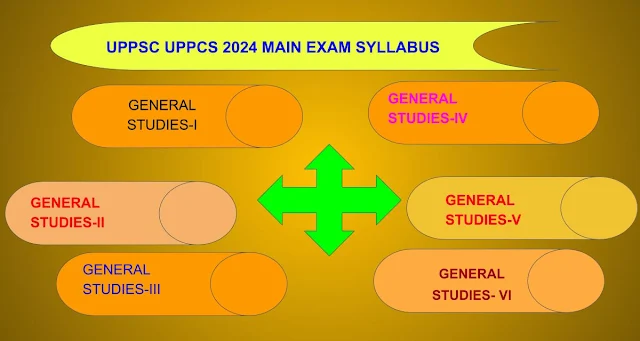UPPSC UPPCS SYLLABUS IN HINDI
Main Examination Syllabus for General Studies paper I to VI
GENERAL STUDIES-I
1- History of Indian Culture will cover the salient aspects of Art Forms, literature and Architecture from ancient to modern times.
2- Modern Indian history (from A.D.1757 to A.D. 1947): Significant events, personalities and issues, etc.
3-The Freedom Struggle-its various stages and important contributors/contributions from different parts of the country. 4-Post-independence consolidation and reorganization within the country (till 1965A.D.). th th
5-History of the world will include events from 18 century to middle of the 20 century such as French revolution of 1789, Industrial revolution, World Wars, redraw of nationalboundaries,Socialism,Nazism,Fascism etc-theirformsand effecton the society.
6-Salient features of Indian Society and culture.
7-Role of Women in society and women's organization, population and associated issues, povertyand developmental issues,urbanization,theirproblemsand theirremedies.
8-Meaning of liberalization, privatization and globalization and their effects on economy, polity and social structure.
9-Social empowernment, communalism, regionalism & secularism.
10-Distribution of major natural resources of World- Water, Soils, Forests in reference to South and South-East Asia with special reference to India. Factors responsible for the location of industries (with special reference to India).
11-Salient features of Physical Geography- Earthquake, Tsunami, Volcanic activity, Cyclone, Ocean Currents, winds and glaciers.
12-Oceanic resources of India and their potential.
13-Human migration-refugee problem of the World with focus on India.
14-Frontiers and boundaries with reference to Indian sub-continent.
15-Population and Settlements- Types and Patterns, Urbanization, Smart Cities and Smart Villages.
GENERAL STUDIES-II
1-Indian Constitution- historical underpinnings, evolution, features, amendments, significant provisions and basic structure, Role of Supreme Court in evolution of basic provisions of Constitution.
2- Functions and responsibilities of the Union and the States: Issues and challenges pertaining to the federal structure, devolution of powers and finances up to local levels and challenges therein.
3-Role of Finance Commission in Centre-State financial relations.
4-Separation of powers, dispute redressal mechanisms and institutions. Emergence and use of alternative dispute redressal mechanisms.
5-Comparison of the Indian constitutional scheme with that of other major democratic countries.
6-Parliament and State legislatures-structure, functioning, conduct of business, powers and privileges and concerned issues.
7-Structure, organization and functioning of the Executive and the Judiciary: Ministries and Departments of the Government, Pressure groups and formal/informal associations and their role in the Polity, Public Interest Litigation (PIL).
8-Salient features of the Reperesentation of People's Act. Appointment to various Constitutional posts, Powers, functions and their responsibilities.
10-Statutory, regulatory and various quasi-judicial bodies including NITI Aayog, their features and functioning.
11-Government policies and interventions for development in various sectors and issues arising out of their design, implementation and Information Communication Technology (ICT).
12-Development processes- the role of Non Governmental Organizations (NGOs), Self Help Groups (SHGs), various groups and associations, donors, charities, institutional and other stakeholders.
13-Welfare schemes for vulnerable sections of the population by the Centre and States and the performance of these schemes, mechanisms, laws, institutions and Bodies constituted for the protection and betterment of these vulnerable sections.
14-Issues relating to development and management of Social Sector/Services relating to Health, Education, Human Resources.
15-Issues relating to poverty and hunger, their implication on body politic.
16-Important aspects of governance. Transparency and accountability, e-governance applications, models, successes, limitations and potential, citizens, charters and institutional measures.
17-Role of Civil Services in a democracy in the context of emerging trends.
18-India and its relationship with neighbouring Countries.
19-Bilateral, Regional and Global groupings and agreements involving India and/ or affecting India's interest.
20-Effect of policies and politics of developed and developing countries on India's interests-Indian diaspora.
21-Important International Institutions, Agencies their structure, mandate and functioning.
22-Current affairs and events of Regional, National and International importance.
